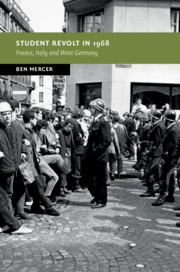Book contents
- Student Revolt in 1968
- New Studies in European History
- Student Revolt in 1968
- Copyright page
- Contents
- Acknowledgements
- Abbreviations
- Introduction: History, Myth and Memory of 1968
- Part I Education and Culture
- Part II The Politics of Revolt
- Part III Crisis of the University
- Conclusion
- Select Bibliography
- Index
Conclusion
Published online by Cambridge University Press: 18 November 2019
- Student Revolt in 1968
- New Studies in European History
- Student Revolt in 1968
- Copyright page
- Contents
- Acknowledgements
- Abbreviations
- Introduction: History, Myth and Memory of 1968
- Part I Education and Culture
- Part II The Politics of Revolt
- Part III Crisis of the University
- Conclusion
- Select Bibliography
- Index
Summary
‘We lost’, admitted Mauro Rostagno at the twentieth anniversary of 1968, ‘Thank goodness we lost.’ Another speaker agreed: ‘it doesn’t interest me if we were defeated at a political level. Who gives a damn? Rather I agree with those who say it is better that way. Who knows what success would have been? Ultimately the most beautiful revolutions have always been defeated.’ Among themselves, the protagonists of 1968 found the consolations of failure. At other times, to other audiences, they defended their experience, especially in the face of derisory accounts. The ironic retrospective self-assessment was only to be expected. Outside the revolutionary atmosphere of the late 1960s, other priorities prevailed. As has been seen in the preceding chapters, experiments dismissed as illusory or maligned as reformist in 1968 quickly recaptured their historic importance in the aftermath of the events. Conversely, political revolution, which appeared so imminent in ’68, could only elicit more cautious consideration in subsequent decades. For the historian, the important task is neither to romanticise the retrospectively ‘important’ aspects of the late 1960s nor dwell on what dated quickly even to the protagonists, but rather to explain how these two sides belonged together. The protests of 1968 proved far more capable of exposing the hypocrisies and inequalities of authority, both within the university and more generally, than they were in establishing alternatives. The failure of some of those alternatives can only elicit a ‘thank goodness’. Others are undoubtedly a source of regret. If nothing else, the protesters forcefully demanded a rethinking of political and cultural power, and exposed, via their own errors, the paradoxes of the search for more democratic forms of authority.
- Type
- Chapter
- Information
- Student Revolt in 1968France, Italy and West Germany, pp. 285 - 289Publisher: Cambridge University PressPrint publication year: 2019



